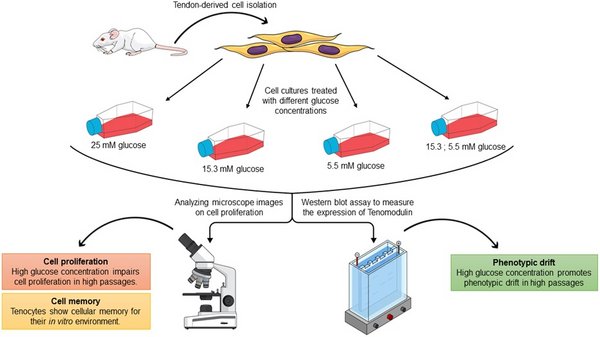
When Diabetes Mellitus is poorly controlled, the mechanical properties of tendons are negatively affected. These altered structural properties cause an increased risk of tendinopathy. This study aimed to investigate the effect of different glucose concentrations on the cell proliferation rate and the expression of the tendon related marker Tenomodulin. Additionally this study investigated the cellular memory of tenocytes by an in vitro model with incremental glucose concentrations. Tendon-derived cells were isolated and cultured. This in vitro model was analyzed with microscopy images using ImageJ software to monitor cell proliferation rate, then a Western blot analysis for the tendon related marker Tenomodulin to verify cell phenotype was performed. It was found that culture medium with high glucose concentrations could impair the cell proliferation rate and the expression of the tendon related marker Tenomodulin, at high passages. Tendon-derived cells in low glucose culture medium behaved like tendon-derived cells that were treated with high glucose culture medium, when treated with high glucose culture medium first. This finding suggest that tenocytes could have a cellular memory for their in vitro environment. Furthermore, the findings of this research could suggest that culture medium with a low glucose concentration is more suitable for in vitro models of tendon-derived cells, as this culture condition shows phenotypic drift in later passages, compared to culture conditions with high glucose. These results are in line with the correlation between diabetes mellitus and tendinopathy.